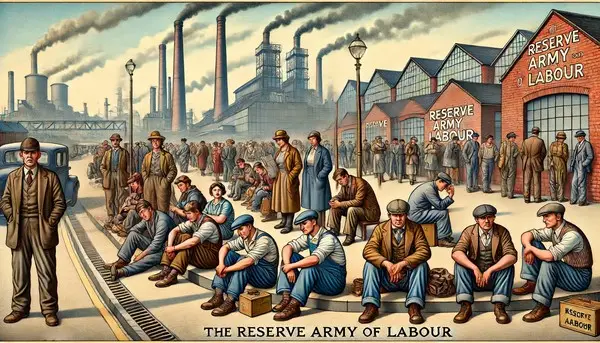Table of Contents
- Origins and Theoretical Foundations
- Types of the Industrial Reserve Army
- Implications of the Industrial Reserve Army
- Contemporary Relevance
- Conclusion
The concept of the “industrial reserve army” is integral to understanding the dynamics of labor markets within capitalist economies. Coined by Karl Marx, this term refers to the surplus labor force that exists within a capitalist system, characterized by its cyclical expansion and contraction in response to economic fluctuations. This essay provides a comprehensive outline and explanation of the industrial reserve army, discussing its origins, functions, and implications within the broader socio-economic framework.
Origins and Theoretical Foundations
Karl Marx and the Industrial Reserve Army
The concept of the industrial reserve army is rooted in Marxist economic theory. Karl Marx introduced the term in his seminal work, “Das Kapital,” to describe the pool of unemployed or underemployed workers who are available for work when needed by capitalists but can be laid off during economic downturns. Marx viewed the industrial reserve army as a crucial component of the capitalist mode of production, enabling the system to adjust labor supply according to market demands.
The Role in Capitalist Production
In Marx’s analysis, the industrial reserve army serves several key functions within the capitalist economy:
- Regulation of Wages: The existence of a surplus labor force exerts downward pressure on wages. Employers can leverage the threat of unemployment to suppress wage demands, maintaining higher profit margins.
- Flexibility and Adaptation: The reserve army provides a flexible labor pool that capitalists can draw upon during periods of economic expansion. This flexibility facilitates rapid adaptation to market changes and technological advancements.
- Discipline of the Workforce: The presence of unemployed workers serves as a disciplinary mechanism for the employed. Fear of job loss can compel workers to accept unfavorable working conditions and increased productivity demands.
Historical Context
The industrial reserve army emerged alongside the development of industrial capitalism in the 19th century. The transition from agrarian economies to industrial production resulted in significant demographic shifts, with rural populations migrating to urban centers in search of work. This migration created a fluctuating labor pool, characterized by periodic employment instability and the formation of a surplus workforce.
Types of the Industrial Reserve Army
Marx categorized the industrial reserve army into several distinct groups, each with specific characteristics and roles within the labor market. These categories include:
The Floating Reserve
The floating reserve consists of workers who are intermittently employed and unemployed. These individuals frequently move in and out of the labor market, often engaging in temporary, part-time, or casual employment. The floating reserve is highly responsive to economic cycles, expanding during downturns and contracting during periods of growth.
The Latent Reserve
The latent reserve encompasses segments of the population that are not currently engaged in the labor market but have the potential to enter it. This category includes individuals such as housewives, students, and retirees, who may join the workforce under certain economic conditions. The latent reserve represents a hidden pool of labor that can be mobilized in response to labor shortages.
The Stagnant Reserve
The stagnant reserve comprises individuals who are permanently marginalized within the labor market. These workers often face structural barriers to employment, such as lack of skills, discrimination, or chronic health issues. Despite their availability, the stagnant reserve experiences prolonged periods of unemployment or underemployment.
The Pauperized Reserve
The pauperized reserve refers to the most impoverished and destitute segments of the population. These individuals live in extreme poverty and often rely on informal or precarious employment. The pauperized reserve represents the lowest strata of the labor market, characterized by high levels of exploitation and vulnerability.
Implications of the Industrial Reserve Army
Get the full article AD FREE. Join now for full access to all premium articles.
View Plans & Subscribe Already a member? Log in.





